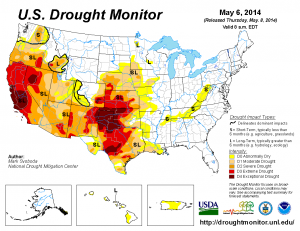Climate Change – Here Today, Not Gone Tomorrow
May 12th, 2014 | By admin | Category: Climate ChangeBy Suzanne York, www.howmany.org
All one really needs to take away from the 800-page National Climate Assessment (NCA), mandated every four years by the U.S. Congress, is this: Human-induced climate change is projected to continue, and it will accelerate significantly if emissions of heat-trapping gases continue to increase.As published in the NCA, “The magnitude of climate change beyond the next few decades depends primarily on the amount of heat-trapping gases that human activities emit globally, now and in the future.” And the outlook is not positive – this past April was the first month in recorded history when the amount of carbon dioxide in the atmosphere averaged over 400 parts per million.
Going Beyond Extreme
The NCA scientists report that increased heat, drought, and insect outbreaks, all linked to climate change, have increased wildfires. Declining water supplies, reduced agricultural yields, health impacts in cities due to heat, and flooding and erosion in coastal areas are additional concerns.
What does this mean for Southwest, and for states such as California – the most populous in the union – where the entire state is experiencing some level of drought (and 76% extreme drought conditions)?
Key Messages for California and the Southwest:
- Reduced snowpack and streamflows – projected to decline, in turn decreasing surface water supply reliability for cities, agriculture, and ecosystems;
- Threats to agriculture – reduced yields from increasing temperatures and increasing competition for scarce water supplies will displace jobs in some rural communities;
- Increased wildfire – increased warming, drought, and insect outbreaks, all caused by or linked to climate change, have increased wildfires and impacts to people and ecosystems;
- Sea level rise and coastal damage – flooding and erosion in coastal areas are already occurring at existing sea levels and damaging some California coastal areas during storms and extreme high tides;
- Heat threats to health – projected regional temperature increases, combined with the way cities amplify heat, will pose increased threats and costs to public health.
Even the Southeast and Caribbean regions were called out for projected water impacts, where “Decreased water availability, exacerbated by population growth and land-use change, will continue to increase competition for water and affect the region’s economy and unique ecosystems.”
Even those who don’t live in the Southwest are likely aware that most of this is already occurring. And those that deny it, well, they are living in denial of reality. By the way, the report was written by “A team of more than 300 experts guided by a 60-member Federal Advisory Committee produced the report, which was extensively reviewed by the public and experts, including federal agencies and a panel of the National Academy of Sciences.”
Taking Direction From Youth
Perhaps we can take heart in today’s youth, who seem to grasp the severity of the problem better than others – after all, it is their future at stake. They see a lack of action on human-induced climate change as a violation of their constitutional rights.
A growing number of young people are bringing lawsuits against some U.S. government agencies on climate change inaction. One case, to be heard at the U.S. Court of Appeals for the D.C. Circuit, relies on the public trust doctrine, which requires government to protect resources essential to the survival of all generations.
This is part of a nationwide legal campaign started by youth with support from some of the world’s leading climate scientists and legal scholars.
“It’s important that the youth of this country remind our representatives that their main purpose is to protect the people,” said 13-year-old Xiuhtezcatl Roske-Martinez, a plaintiff in the lawsuit. “Climate change is the biggest issue of our time.”
Imagine if adults could be mobilized to understand this and create a better future for all?
Suzanne York is a senior writer with the Institute for Population Studies.



